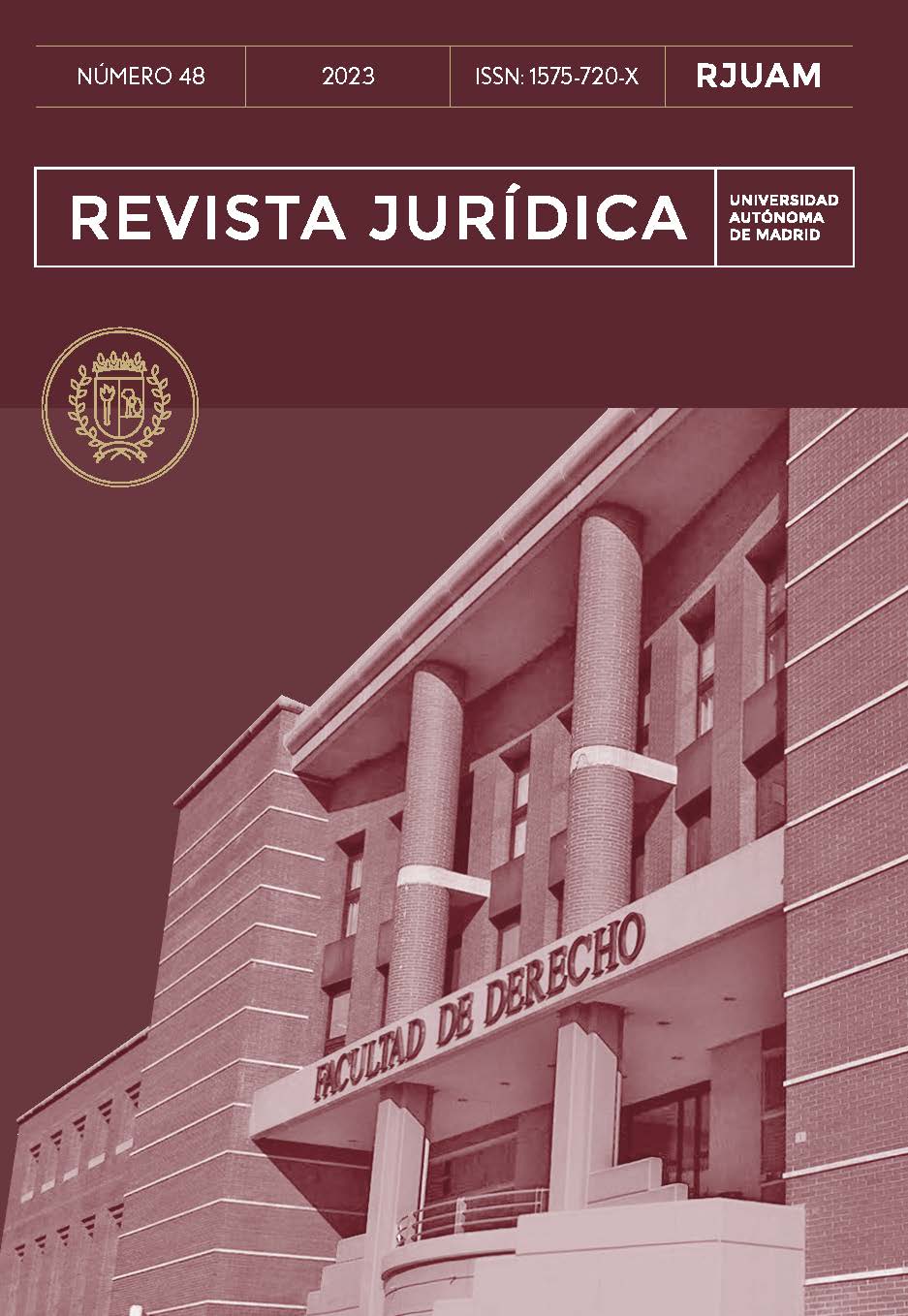The European Union's response to disinformation: tracing its security nature
Keywords:
desinformation, European Union, securitization theory, interpretative frameworks, agenda setting theoryCopyright (c) 2024 Revista Jurídica Universidad Autónoma de Madrid

This work is licensed under a Creative Commons Attribution-NonCommercial-NoDerivatives 4.0 International License.
Abstract
Following Russia’s annexation of Crimea in 2014, disinformation entered the European Union’s political agenda as a security matter related to foreign action. Building upon the theory of securitization, the present study analyses the establishment of the European Union’s agenda concerning disinformation using the process-tracing method. It aims to examine the origin of a security interpretative framework from which institutional-level approaches to disinformation are made. The results confirm that the annexation of Crimea has had a significant influence on the establishment of this framework, which persisted during the studied period and was reinforced through a securitization process that elevated disinformation to the level of a threat through discursive practices. However, a broader understanding of the phenomenon would have prompted the evolution of the Union’s concerns.
Downloads
References
BALZACQ, T., LÉONARD, S. y RUZICKA, J., «Securitization’ revisited: theory and cases», International Relations, 30(4), 2016, pp. 1-38.
BEACH, D. y PEDERSEN, R. U., Process-Tracing Methods: Foundations and Guidelines, Michigan (University of Michigan Press), 2013.
BOUZA GARCÍA, L., «Enmarcar, narrar y convencer: el papel de la información y las ideas en el proceso político de la UE», Cuadernos Europeos de Deusto, 55, 2016, pp. 61-83.
BRAUN, K., «Between representation and narration: analysing policy frames», Handbook of Critical Policy Studies, 2015, pp. 441-461.
CONSEJO EUROPEO, «Reunión del Consejo Europeo – Conclusiones (EUCO 11/15)», 19 y 20 de marzo de 2015. Dispoinble en: ?https://www.consilium.europa.eu/media/21872/st00011es15.pdf?. [Consultado el 6/01/2023].
COMISIÓN EUROPEA, «La lucha contra la desinformación en línea: un enfoque europeo» (COM (2018) 236 final), 24 de abril de 2018. Disponible en: ?https://eur-lex.europa.eu/legal-content/es/TXT/?uri=CELEX%3A52018DC0236?. [Consultado el 04/01/2023].
COMISIÓN EUROPEA, «Aumentar la resiliencia y desarrollar las capacidades para hacer frente a las amenazas híbridas» (JOIN (2018) 16 final), 13 de junio de 2018. Disponible en: ?https://eur-lex.europa.eu/legal- content/ES/TXT/?uri=CELEX%3A52018JC0016?. [Consultado el 10/12/2023].
COMISIÓN EUROPEA, «Código de buenas prácticas de la Unión en materia de desinformación», 2018. Disponible en: ?https://digital- strategy.ec.europa.eu/en/library/2018-code-practice-disinformation?. [Consultado el 03/02/2023].
COMISIÓN EUROPEA y ALTA REPRESENTANTE, «Plan de Acción contra la desinformación» (JOIN (2018) 36 final), 5 de diciembre de 2018. Disponible en: ?https://data.consilium.europa.eu/doc/document/ST-15431-2018-INIT/es/pdf?. [Consultado el 10/12/2022].
DATZER, V. y LONARDO, L., «Genesis and evolution of EU anti disinformation policy: entrepreneurship and political opportunism in the regulation of digital technology», Journal of European Integration, 2022, pp. 1-16.
DAVITER, F., «Framing Biotechnology Policy in the European Union», Research Papers in Economics, 2012. Disponible en: ?https://www.sv.uio.no/arena/english/research/publications/arenapublications/workingpapers/working-papers2012/wp5-12.pdf?. [Consultado el 10/12/2022].
GERRITS, A. W., «Disinformation in International Relations: How Important Is It?», Security and Human Rights, 29(1-4), 2018, pp. 3-23.
HLEG ON FAKE NEWS AND ONLINE DISINFORMATION (ed.), «A multi-dimensional approach to disinformation», Publications Office of the European Union, 2018, pp.1-44. Disponible en: ?https://digital-strategy.ec.europa.eu/en/library/final-report-high-level-expert-group-fake-news-and-online-disinformation?. [Consultado el 11/11/2022].
MIKULSKI, K., «Europe versus disinformation: resilience building in selected countries: Disinformation and hybrid threats through the lens of European Union laws and policies», The Kosciusko Institutem, 2021. Disponible en: ?https://ik.org.pl/wp-content/uploads/europe_vs_disinforamtion.pdf?. [Consultado el 29/03/2023].
NYE, J., «How Sharp Power Threatens Soft Power: The Right and Wrong Ways to Respond to Authoritarian Influence», Foreign Affairs, 2018. Disponible en: ?https://www.foreignaffairs.com/articles/china/2018-01-24/how-sharp-power-threatens-soft-power?. [Consultado el 11/11/2022].
OLEART, A. y BOUZA GARCÍA, L. B., «El debate transatlántico sobre la definición y actuación ante la desinformación: una agenda de investigación», adComunica, Revista Científica de Estrategias, Tendencias e innovación en Comunicación, 2022, pp. 51-74.
ÖRDÉN, H., «Deferring substance: EU policy and the information threat», Intelligence and National Security, 34(3), 2019, pp. 421-437.
PAMMENT, J., «The EU’s Role in Fighting Disinformation: Taking Back the Initiative», Carnegie Endowment for International Peace, 2020, pp. 1-21. Disponible en: ? https://carnegieendowment.org/files/Pamment_-_Future_Threats.pdf?. [Consultado el 10/12/2022].
PARLAMENTO EUROPEO, «Informe sobre la comunicación estratégica de la Unión para contrarrestar la propaganda de terceros en su contra» (2016/2030(INI)), 14 de octubre de 2016. Disponible en: ?https://www.europarl.europa.eu/doceo/document/A-8-2016-0290_ES.html?. [Consultado el 11/01/2022].
PETERS, B. G., «Agenda?setting in the European community», Journal of European Public Policy, 1(1), 1994, pp. 9-26.
PRINCEN, S. y RHINARD, M., «Crashing and creeping: agenda-setting dynamics in the European Union», Journal of European Public Policy, 13(7), 2006, pp. 1119-1132.
PRINCEN, S., «Agenda-setting in the European Union: a theoretical exploration and agenda for research», Journal of European Public Policy, 14(1), 2007, pp. 21- 38.
RICEPUTI, M., «The EU’s Response to Disinformation in the Run-up to the 2019 European Elections: Ideational, Political and Institutional Genesis of a Nascent Policy», Bruges Political Research Papers, 85, College of Europe, 2021. Disponible en: ?https://www.coleurope.eu/sites/default/files/research-paper/wp85_riceputi.pdf?. [Consultado el 11/01/2022].
RONE, J., «The return of the state? Power and legitimacy challenges to the EU’s regulation of online disinformation», Power and Authority in Internet Governance, 2021, pp. 171-194.
SERVICIO EUROPEO DE ACCIÓN EXTERIOR (SEAE), «Una visión común, una actuación conjunta: una Europa más fuerte: Estrategia global para la política exterior y de seguridad de la Unión Europea», Oficina de Publicaciones, 2016. Disponible en: ?https://op.europa.eu/es/publication-detail/- /publication/3eaae2cf-9ac5-11e6-868c-01aa75ed71a1/language-es?. [Consultado el 04/10/2022].
VANHOONACKER, S. y POMORSKA, K., «The European External Action Service and agenda-setting in European foreign policy», Journal of European Public Policy, 20(9), 2013, pp. 1316-1331.
WALKER, C. y LUDWIG, J., «The Meaning of Sharp Power: HowAuthoritarian States Project Influence», Foreign Affairs, 2017. Disponible en: ?https://www.foreignaffairs.com/articles/china/2017-11-16/meaning-sharp-power?. [Consultado el 14/12/2022].
?
